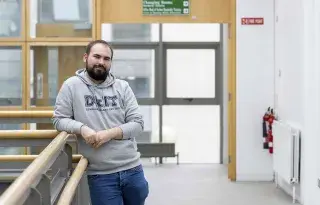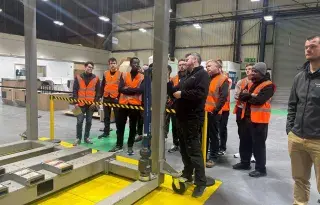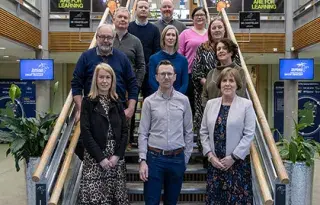BEng in Mechanical Engineering

Search to find a different course
Course Overview
This course is aimed at students who wish to learn key skills in engineering to gain employment in the many companies in the local region and beyond. This course develops both technical and professional skills required to become a successful mechanical engineer. There is a focus on engineering education with practical experience in inventing, designing, manufacturing, running, and maintaining mechanical systems equipment and tools. Course topics include mechanics, fluids, heat, mathematics, materials, manufacturing, and computer-aided design.
Core themes across the course are maths skills, health and safety, data analysis, environmental awareness, sustainability and management.
What makes this course different
Annual Careers Fair
There is a dedicated Engineering careers fair at DkIT each year with over 30 companies seeking graduates. Graduates are very well received by local industry, with most Year 4 students securing employment before the end of their studies.
Excellent Career Prospects
100% of graduates are in employment after 6 months of graduating and 100% of graduates said their degree was essential for that job role (DkIT/ HEA graduate survey).
Engineers Ireland Accreditation
This course has Engineers Ireland accreditation to Associate Engineer level, A.Eng., which is internationally recognised.
Understanding the Industry
Mechanical engineers design and manufacture innovative, efficient and reliable solutions to real word problems, and are at the forefront of environmental and sustainability challenges.
Engineering is in demand at the moment and Mechanical Engineers are essential to every sector and are in huge demand by local and national industry for their problem-solving skills and versatility.
Career Opportunities
Graduates of this course have found employment in product design, machinery and vehicle design and manufacturing, the Agri-Food industry, energy generation, medical devices & pharma industries, aerospace and building products industries.
Future Careers:
- Mechanical engineer
- CAD/Design engineer
- Manufacturing engineer
- Process engineer
- Automotive engineer
In these areas:
- Vehicles and utility vehicle engineering (Combilift, Cargotec, Multihog)
- Manufacturing (Kingspan, Glen Dimplex)
- National railway transport engineering (Irish Rail)
- Automation and robotics (Controlsoft, Anord Mardix, Hanley Energy)
- Bespoke engineering (Suretank, Flexitech)
Demand for our graduates in a wide range of engineering industries has been strong with many having job offers from both local and national companies shortly after sitting their final exams.
Graduates work at
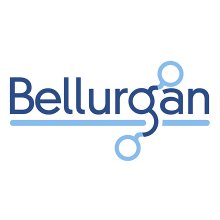
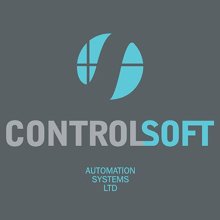
Course Delivery and Modules
Details of each module can be found on the DkIT curriculum management site.
The curriculum described below is valid for 2025-26 academic year only.
Semester 1
- CAD
- Engineering Science
- Materials and Workshop practice
- Mathematics 1 (common engineering level 7)
- Mechanical Engineering Practice
- Mechanics 1.0
Semester 2
- Design Build Test
- Mathematics 2.0 (common engineering level 7)
- Electrical Technology
- Manufacturing Engineering
- Mechanics 2.0
- Programming for mechanical engineers
Semester 1
- Electrical Automation Technology
- Fluid Mechanics
- Materials Technology
- Mathematics 3
- Mechanical Engineering Design
- Mechanics 3
Semester 2
- Engineering Design Project
- Mathematics 4
- Mechanics 4
- Programming for mechanical engineers
- Sustainable manufacturing
- Thermodynamics
Semester 1
- Applied mechanics
- Automation and control
- Design project and professional skills
- Engineering Management
- Mathematics 5
- Thermofluids
Semester 2
- Health and Safety and planning in the workplace
- Work placement mechanical level 7
Work placement
In Year 3 students undertake a minimum 13-week industry work placement where they gain important contacts within the industry to help them in their future careers. Many of our graduates go back to those companies on completion of their degrees. Employers include; Mercury Engineering, Jones Engineering, Cargotec, Megalift, TSM Controls, Great Northern Distillery, and M&L Manufacturing.
Professional Accreditations
Engineers Ireland accreditation
This course is recognised by Engineers Ireland as meeting international standards commensurate with Associate Engineer (A. Eng) standing.
Engineers Ireland’s accreditation is an objective evaluation and approval of third level engineering programmes, ensuring that they meet international standards, the needs of the engineering profession and broader responsibilities to society, environment and economy.
Accreditation is a periodic assessment of a programme of engineering education against accepted standards. The hallmark of a professional engineer is the ability to apply the learning outcomes gained during study to real-world situations. These are assessed as working experiences or learned competencies.
Graduates of accredited programmes, at the appropriate standard, may go on to achieve one of the professional titles of Chartered Engineer, Associate Engineer, and Engineering Technician. Find out more about the Engineers Ireland Accreditation Criteria.
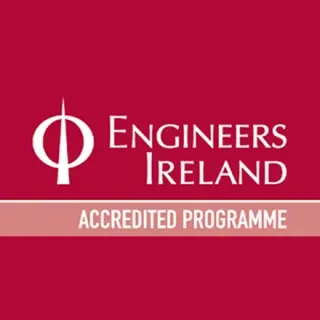
Education Progression
On completion of this course, students will be eligible to transfer to Year 4 of the Level 8 course: BEng (Hons) in Mechanical Engineering or the BSc (Hons) in Engineering Entrepreneurship Add-on. (This will be subject to student numbers. Where places are limited, offers will be linked to the final average mark in 3rd year, with a minimum of 50% average required to progress.)
BEng (Hons) in Mechanical Engineering
BSc (Hons) in Engineering Entrepreneurship
Fees and Funding
Please find information on fees and funding here.
Entry requirements
Standard entry requirements apply. There are no special entry requirements for this course.
- Standard Requirements for Leaving Certificate Applicants
- Standard Requirements for UK/NI Applicants
- Standard Requirements for QQI-Further Education Applicants
Recent CAO points
How to apply
Apply on CAO
All standard entry first-year applicants must apply for entry through the CAO. See Important application dates for CAO and information for specific applicant types below:
Advanced Entry & Transfer Applications
Advanced Entry is for applicants who have previous educational achievements and/or work experience and want to be considered for direct entry into year 2, 3, or 4 of a course. This includes students looking to transfer to DkIT from another Higher Education provider.
International Application (non-EU)
International Applicants (not from or living in the EU) can apply through an agent or directly to DkIT to study this course.
Ask us a Question
If you have a question about the BEng in Mechanical Engineering please ask it below and we will get back to you.
Course News
View all NewsDisclaimer: All module titles are subject to change and for indicative purposes only. All courses are delivered subject to demand and timetables are subject to change. Elective Module options will only run subject to student numbers. The relevant Department will determine the viability of each elective module option proceeding depending on the number of students who choose that option. Students will be offered alternative elective modules on their programme should their preferred elective option not be proceeding. Award Options for Common Entry Programmes: The relevant Department will determine the viability of each award option proceeding depending on the number of students who choose either option. If the numbers for one of the Award options exceed available places, students for this option will be selected based on Academic Merit (highest grades).
